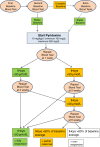Guidelines for the diagnosis and management of cystathionine beta-synthase deficiency
- PMID: 27778219
- PMCID: PMC5203861
- DOI: 10.1007/s10545-016-9979-0
Guidelines for the diagnosis and management of cystathionine beta-synthase deficiency
Abstract
Cystathionine beta-synthase (CBS) deficiency is a rare inherited disorder in the methionine catabolic pathway, in which the impaired synthesis of cystathionine leads to accumulation of homocysteine. Patients can present to many different specialists and diagnosis is often delayed. Severely affected patients usually present in childhood with ectopia lentis, learning difficulties and skeletal abnormalities. These patients generally require treatment with a low-methionine diet and/or betaine. In contrast, mildly affected patients are likely to present as adults with thromboembolism and to respond to treatment with pyridoxine. In this article, we present recommendations for the diagnosis and management of CBS deficiency, based on a systematic review of the literature. Unfortunately, the quality of the evidence is poor, as it often is for rare diseases. We strongly recommend measuring the plasma total homocysteine concentrations in any patient whose clinical features suggest the diagnosis. Our recommendations may help to standardise testing for pyridoxine responsiveness. Current evidence suggests that patients are unlikely to develop complications if the plasma total homocysteine concentration is maintained below 120 μmol/L. Nevertheless, we recommend keeping the concentration below 100 μmol/L because levels fluctuate and the complications associated with high levels are so serious.
Conflict of interest statement
Compliance with ethical standards Competing interests The authors of these guidelines declare no competing interests but disclose the following: Andrew Morris, Tawfeg Ben-Omran, Anupam Chakrapani, Ellen Crushell, Martina Huemer, Sufin Yap, Henk Blom and Kimberly Chapman have received honoraria for lectures and/or hotel/travel expenses for relevant meetings from Orphan Europe or the Recordati Rare Disease Foundation. Henk Blom has received a research grant from Orphan Europe. Charles University in Prague-First Faculty of Medicine received support from the Recordati Rare Disease Foundation for organizing an educational course on homocystinurias and methylation defects, and reimbursement for laboratory analyses from Orphan Technologies. HCU Network Australia has received sponsorship from Orphan Technologies and support from the Recordati Rare Disease Foundation for a patient expert meet.
Figures




Comment in
-
Guidelines on homocystinurias and methylation defects: a harmonized approach to diagnosis and management.J Inherit Metab Dis. 2017 Jan;40(1):1-2. doi: 10.1007/s10545-016-9998-x. J Inherit Metab Dis. 2017. PMID: 27896524 No abstract available.
References
-
- Abbott MH, Folstein SE, Abbey H, Pyeritz RE. Psychiatric manifestations of homocystinuria due to cystathionine beta-synthase deficiency: prevalence, natural history, and relationship to neurologic impairment and vitamin B6-responsiveness. Am J Med Genet. 1987;26:959–969. doi: 10.1002/ajmg.1320260427. - DOI - PubMed
-
- Acosta PB (2010) Evaluation of nutritional status. In: Acosta PB (ed) Nutrition management of patients with inherited metabolic disorders. Jones and Bartlett, Sudbury, pp 67–98
Publication types
MeSH terms
Substances
LinkOut - more resources
Full Text Sources
Other Literature Sources

